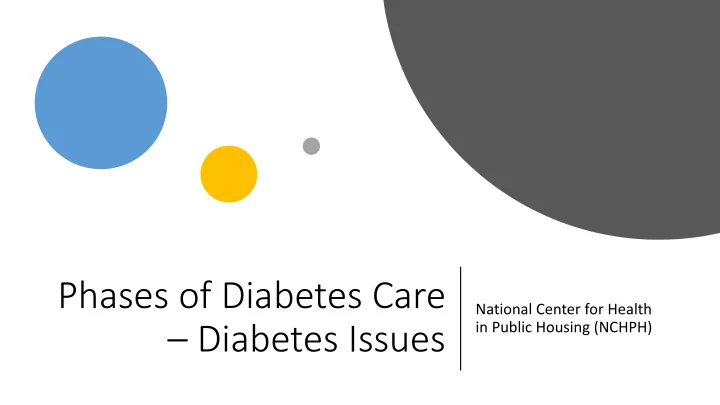

Phases of Diabetes Care National Center for Health – Diabetes Issues in Public Housing (NCHPH)
This Learning Collaborative is supported by the Health Resources and Services Administration (HRSA) of the U.S. Department of Health and Human Services (HHS) as part of an award Acknowledgment totaling $608,000 with 0% financed with non- Statement governmental sources. The contents are those of the author(s) and do not necessarily represent the official views of, nor an endorsement, by HRSA, HHS, or the U.S. Government. For more information, please visit HRSA.gov
What Do Need to Do to Improve Diabetes Care What are the causes of Patients Facility failure treatment? What potential How NCAs can help in Solutions have put in the process? place?
Phases of Diabetes Care Pre-Visit Intra-Visit Post-Visit
Pre-Visit Preparation STARTS AT THE END OF SCHEDULE NEW EXAMS THE CURRENT VISIT APPOINTMENT
Pre-Visit Preparation PROACTIVELY IDENTIFY REMINDERS DIABETES EDUCATORS PREPARARE PATIENTS TEAM HUDDLES PATIENTS DUE FOR (DIABETES ENCOUNTER DIABETES VISITS FORMS)
Intra-Visit Diabetes Flow Sheets Patients Concerns and Questions are Addressed Counsel Patients
Counseling Patients Transtheoretical (Stages of Change) Model Precontemplation Contemplation Preparation Action Maintenance
Frames for Addressing Health Risk Behavior • Feedback about Personal Risk • Responsibility of Patient • Advise to Change • Menu of Options • Empathy • Self-Efficacy Enhancement
Do we really Need new ways to helping people with diabetes improve their self- care? Motivational NHANES and Diabetes Care: How are you Interviewing doing? Over 22 years of NHANES surveys 98.5% to 81.2% of people with Diabetes were not reaching healthy goals
Reactance – When Freedoms drift away people reach out to hold onto them tightly Why don’t people do Ambivalence – Our Internal Committee what we tell them to do? It cost a lot to change Depression, substance abuse, mental or cognitive issues
Discord (arguing for change) Even we can inhibit Change The Righting Reflex (telling people what we think they should do)
Helpful Signs Tell us When • Working persuasively without permission We Resort to • As we attempt to “install change” we are the RIGTHING working harder than the patient REFLEX
Post-Visit • After Visit-Summary • Education Materials • Referrals (specialists/community Resources) • Medication Management • Inter-Visit Communications: o Care Coordinators o e-Communication
Recommend
More recommend